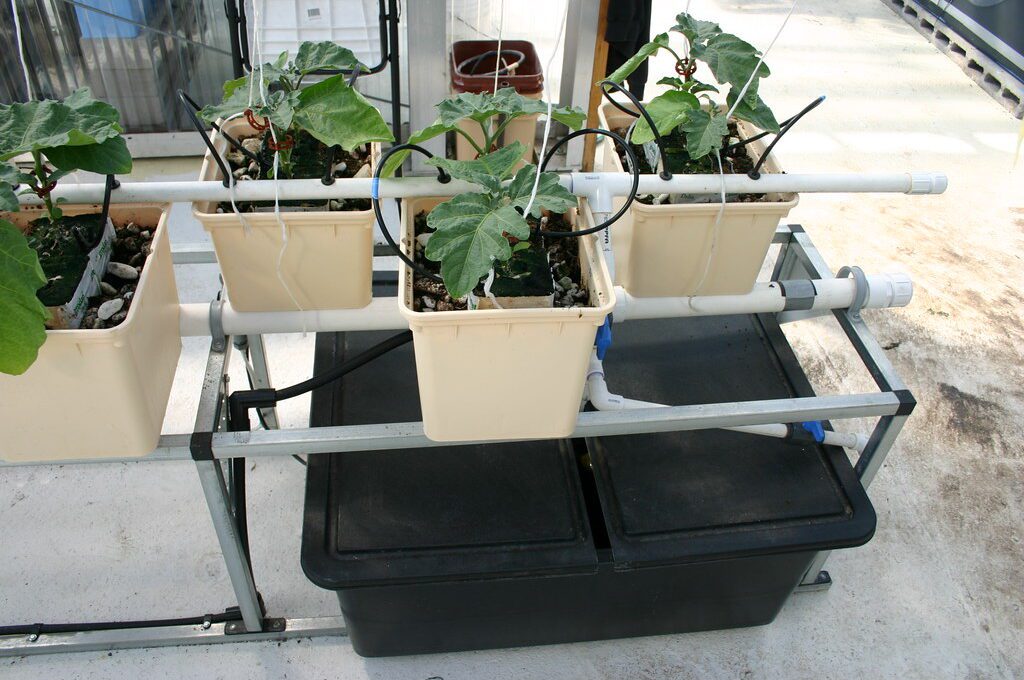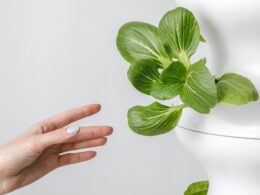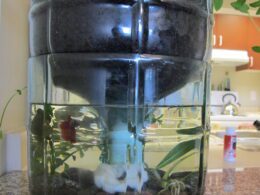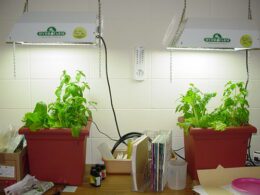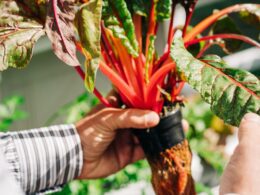Are you concerned about the safety and nutritional value of your food? With the rise of hydroponic farming, you may be wondering if this type of food is as healthy as conventionally grown produce.
Hydroponic farming is a method of growing plants without soil, using nutrient-rich water instead. While this method has been around for centuries, it has gained popularity in recent years as a way to produce fresh, locally grown produce in urban areas.
But is hydroponic food as healthy as traditional produce?
In this article, we will explore the nutritional value, taste, and safety of hydroponic food. We will also take a closer look at the chemicals used in hydroponic farming and whether they pose a risk to your health.
By the end of this article, you will have a better understanding of whether hydroponic food is a safe and healthy choice for you and your family. So, let’s dive in and explore this topic together.
Understanding Hydroponic Farming
You’re learning about a revolutionary way to grow plants without soil, and it’s fascinating how this method can produce fresh and nutrient-rich produce year-round. This innovative farming method is called hydroponics, and it involves growing plants in a nutrient-rich water solution instead of soil.
Hydroponic farming has become increasingly popular in recent years due to its many benefits, including improving crop yields, reducing water usage, and minimizing the use of harmful pesticides.
Vertical farming is a popular form of hydroponics that involves growing plants in vertically stacked layers. This method allows for more plants to be grown in a smaller space, making it ideal for urban areas where space is limited. Vertical farming also reduces transportation costs and carbon emissions since the produce is grown locally and can be harvested year-round.
Hydroponic farming is one of many sustainable solutions for producing fresh and healthy produce. By eliminating the need for soil, hydroponic farming reduces the amount of land needed for agriculture and minimizes soil erosion. Additionally, since hydroponic farming uses less water than traditional farming methods, it’s a more environmentally friendly option.
With all of its benefits, it’s easy to see why hydroponic farming is becoming increasingly popular as a way to produce fresh, healthy, and sustainable produce.
Nutritional Value of Hydroponic Food
Discover the impressive nutritional benefits that come with growing produce using hydroponic farming techniques. Hydroponic farming is a soil-free method of growing plants in nutrient-rich water, which allows for precise control of the plant’s environment.
This means that the nutrient density in hydroponic produce is often higher than in conventionally grown produce. Studies have shown that hydroponic produce contains more vitamins and minerals than conventionally grown produce.
For example, hydroponic lettuce has been found to contain higher levels of vitamin C, iron, and calcium than lettuce grown in soil. This is because the plants are able to absorb nutrients more efficiently in a hydroponic system.
Incorporating hydroponic produce into your diet can be a simple and delicious way to increase your nutrient intake. Plus, with hydroponic farming techniques, you can feel confident that you’re consuming produce that’s free from harmful chemicals and pesticides.
So, consider adding hydroponic fruits and vegetables to your next meal for a healthy and flavorful boost.
Does Hydroponic Food Taste as Good as Traditional Farm-Grown Food?
Does hydroponic food taste different from traditional farm-grown food? This is a question many people ask. The hydroponic food taste difference is subjective. Some argue that hydroponic produce lacks the same depth of flavor as soil-grown crops. However, others appreciate the clean and crisp taste of hydroponic greens. Ultimately, personal preference plays a significant role in determining whether hydroponic food satisfies one’s taste buds.
Taste and Safety of Hydroponic Food
When it comes to hydroponic food, you might be wondering about the taste and texture. Does it compare to traditional soil-grown produce?
Additionally, safety concerns and regulations may also be on your mind. Rest assured, we’ll cover all of these topics in this discussion.
Flavor and Texture
The taste and feel of hydroponically grown produce may differ slightly from conventionally grown options. Hydroponic produce is grown in a soilless environment, which can lead to a different flavor and texture. However, hydroponic produce is also grown in a controlled environment, which allows for optimal growing conditions and consistent flavor and texture.
When it comes to flavor vs nutrition, hydroponic produce can be just as nutritious as conventionally grown options. However, consumer preferences may vary. Some people may prefer the taste and texture of conventionally grown produce, while others may prefer the consistent flavor and texture of hydroponic produce.
Ultimately, the choice between hydroponic and conventionally grown produce comes down to personal preference, but both options can provide healthy and nutritious food choices.
Safety Concerns and Regulations
There are regulations and safety concerns that must be addressed when it comes to growing produce without soil. Hydroponic farms need to comply with strict rules to ensure their crops are safe for consumption.
Here are some of the regulatory compliance and safety concerns that you must be aware of when consuming hydroponic food:
-
Proper Nutrient Management: Hydroponic farms need to manage their nutrients carefully to avoid excess levels of minerals and chemicals in the plants. These excess levels can be harmful to humans when consumed.
-
Water Management: Hydroponic farms use water to grow their plants, and this water needs to be clean and free of harmful bacteria and chemicals. Farmers must ensure that the water used in their hydroponic systems meets the required standards.
-
Pest Control: Hydroponic farms need to control pests without using harmful chemicals that can affect the crops and the people consuming them. Farmers need to use safe and effective pest control methods to keep their crops healthy.
-
Consumer Awareness: Consumers need to be aware of the regulatory compliance and safety concerns when consuming hydroponic food. It’s essential to purchase hydroponic produce from reputable sources that follow the required regulations and safety guidelines.
In conclusion, hydroponic food can be just as healthy as traditionally grown produce if grown under the right conditions. Regulatory compliance and safety concerns must be addressed to ensure the safety of the crops and the people consuming them. As a consumer, it’s essential to be aware of these concerns and purchase hydroponic produce from reputable sources.
The Use of Chemicals in Hydroponic Farming
In hydroponic farming, you may have concerns about the use of chemicals.
There are different types of chemicals used in hydroponic farming, each with their own risks and benefits.
Understanding these factors can help you make informed decisions about the safety and quality of the food you consume.
Types of Chemicals Used
You might be surprised to learn about the different types of chemicals used in the production of some crops in hydroponic farming. While hydroponic farming is generally pesticide-free, some farms still use chemicals to boost plant growth and prevent diseases.
These chemicals include synthetic fertilizers, herbicides, and fungicides. Synthetic fertilizers are used to provide essential nutrients to plants, but they can also harm the environment and human health if not used properly. Herbicides are used to control weeds, but they can also affect the growth of other plants and harm beneficial insects. Fungicides are used to prevent and treat fungal infections, but they can also lead to the development of resistant strains of fungi.
Despite these potential hazards, many hydroponic farms are switching to organic farming practices to ensure that their produce is chemical-free and healthy for consumers.
Risks and Benefits
It’s important to weigh the potential risks and benefits of using chemicals in hydroponic crop production, especially when it comes to environmental impact and consumer safety.
While it’s true that hydroponic systems can reduce certain environmental impacts, such as soil erosion and water waste, the use of chemicals in these systems can also pose risks to the environment and human health.
For example, some hydroponic growers use synthetic chemicals to control pests and diseases, which can potentially harm beneficial insects and pollinators. Additionally, these chemicals can leave residues on the crops themselves, which can be harmful to human health if consumed in large quantities.
It’s important to consider the long-term environmental impact and cost comparison when weighing the risks and benefits of hydroponic crop production, and to opt for methods that prioritize sustainable and safe practices.
Conclusion: Is Hydroponic Food Healthy?
When it comes to the quality of our produce, there’s no denying that we all want to make the best choices for our health and wellbeing.
Hydroponic food is a relatively new concept in the world of agriculture, and while it has its pros and cons, one question remains: is hydroponic food healthy? The answer is yes, but with a caveat.
The pros of hydroponic food include the fact that it can be grown anywhere, in any climate, and year-round. This means that there is a lower environmental impact and less need for transportation, which can reduce carbon emissions. Hydroponic farming also uses less water and pesticides than traditional farming methods.
However, there are also cons to consider, such as the fact that hydroponic food may not have as much flavor as traditionally grown produce since it lacks exposure to soil and other natural elements.
In conclusion, while hydroponic food is healthy, it is important to remember that it is not a replacement for traditional farming methods. Both have their pros and cons, and it is up to each individual to weigh these factors and make the best choice for their health and the environment.
As with any food, it’s important to choose fresh, nutrient-dense options and to support local, sustainable agriculture whenever possible.
Frequently Asked Questions
What are some common crops grown using hydroponic farming methods?
If you’re curious about crops grown using hydroponic farming methods, you’ll be pleased to know that there are quite a few common options.
Vertical farming and urban agriculture make it possible to grow a range of crops without soil, including leafy greens like lettuce and kale, herbs such as basil and parsley, and even strawberries and tomatoes.
Hydroponic farming methods offer a number of benefits, including the ability to grow crops in areas where traditional farming isn’t possible, better control over growing conditions, and a reduced need for water and pesticides.
While some may question the nutritional value of hydroponic crops compared to traditional crops, research suggests that they can be just as healthy and nutritious.
Is hydroponic farming more sustainable than traditional soil-based farming?
Are you looking for a more sustainable farming method? Hydroponic farming may be the answer. By using innovative techniques, hydroponic farming can produce higher yields with less water, land, and pesticides compared to traditional soil-based farming.
This leads to sustainability benefits such as reduced environmental impact and increased food security.
While the health benefits of hydroponic food are still being studied, the sustainability benefits make it a promising option for the future of agriculture.
How does the cost of hydroponic food compare to conventionally-grown produce?
When it comes to comparing the cost of hydroponic food to conventionally-grown produce, it’s important to consider the nutritional value as well.
While hydroponic farming may require more initial investment in terms of equipment and infrastructure, it can ultimately lead to lower costs due to increased efficiency and less water usage.
Additionally, hydroponic plants are often grown in a controlled environment with optimal nutrients and no pesticides, leading to higher nutritional value.
So not only can hydroponic food be cost-effective, but it can also be a healthier choice for you and your family.
Are there any potential negative environmental impacts of hydroponic farming?
If you’re concerned about the potential negative environmental impacts of hydroponic farming, there are some potential solutions and regulatory measures that can help mitigate these concerns.
One solution is to use renewable energy sources to power hydroponic farms, such as solar or wind power. Additionally, using recycled water or rainwater for hydroponic systems can help conserve water resources.
Regulatory measures can also be put in place to ensure that hydroponic farms are operating in an environmentally responsible manner. For example, regulations can require the use of non-toxic pesticides and fertilizers, as well as proper waste management practices.
By implementing these potential solutions and regulatory measures, hydroponic farming can be a sustainable and environmentally-friendly method of food production.
Can hydroponic farming be done on a small scale, such as in a home garden?
Looking for a way to grow your own fresh produce? A DIY hydroponic set up could be just what you need!
Homegrown vegetables are packed with nutrients and have a flavor you can’t find in store-bought produce. But indoor hydroponic farming can pose some challenges. You’ll need to make sure your plants get enough light, water, and nutrients, and you may have to deal with pests and disease.
With a little research and some trial and error, though, you can reap the benefits of homegrown hydroponic produce.
Conclusion
So, is hydroponic food healthy? The answer is a resounding yes.
Hydroponic farming allows for the production of fresh, nutritious food without the use of harmful pesticides or herbicides. Not only is hydroponic food rich in vitamins and minerals, but it also tastes great and is free from contaminants found in traditional farming methods.
While some may still have concerns about the use of chemicals in hydroponic farming, the truth is that these are carefully monitored and regulated to ensure the safety of the food produced.
So, go ahead and enjoy your hydroponic lettuce, tomatoes, and herbs knowing that you’re making a healthy choice for yourself and the environment.





